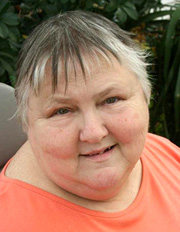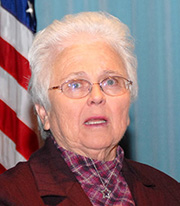The Best Is Yet To Be
By Nancy Ford. Photo by Renee Rodriguez

B.A. Jaetzold is a creative lesbian. She writes poetry and occasionally dabbles with stand-up comedy. But at nearly 60, disabled and retired, she is no longer interested in seeking recreation at the bars where youth rules.
“I wish we had a club for us,” she says.
Finding herself too often succumbing to bouts of depression, despite a solid, long-term relationship with her partner, Jaetzold realizes, too, that the elder population in the gay, lesbian, bisexual, and transgender community seems to be an overlooked population.
“I really don’t know why that is,” she wonders.
“I wish we had our own club,” she says again, adding with a laugh, “even a strip club for us.”
Eric Twombley, 66, is gay and a retired project architect. At one point he, like Jaetzold, found himself depressed, and sought assistance at the Montrose Counseling Center.
“I went [into counseling] with a lot of personal issues that had been hanging around for many years,” Twombley says. “It became exacerbated by turning senior.”
Jaetzold and Twombley are not alone. According to a recent study on aging conducted by the National Gay and Lesbian Task Force, an estimated three million GLBT elders reside in the United States. The study predicts that by 2030, that number will nearly double.
It was through the Montrose Counseling Center that both Jaetzold and Twombley found Seniors Preparing for Rainbow Years, most often referred to by its acronynm, SPRY. The program—an endeavor with components administered by both the counseling center and Legacy Community Health Services—is dedicated to “shining the light into the lives of GLBT seniors for them to be able to experience prideful, bold and bright rainbow years.”
The heart of SPRY is providing mental-health services to the GLBT senior population, according to Chris Kerr, the program coordinator for the SPRY program at the counseling center. “That includes peer counseling, peer support groups, and case management, which helps connect a person to the social-service system and can assist them in accessing help out there if they need it,” he says.
Sometimes, Kerr says, that just involves helping a person apply for Medicare or Medicaid. “You know, connecting them up to any other services that they might need.”
Kerr believes the biggest misconception facing GLBT seniors is that GLBT seniors actually exist.
“They are invisible,” he says. “And then when you allow for the possibility that they exist, they think that they are no longer gay once you reach a certain age. It’s not relevant anymore, [because] people over 60 aren’t really sexually active, so sexual orientation doesn’t make any difference anyway, [because] being GLBT is only about sex. But it’s far more than that. It’s identity and it’s community. It’s all those things.”
Isolation, Kerr says, seems to be a big problem for GLBT seniors and may be the source of other issues like depression or anxiety.
“Helping people break out of their isolation could be a big step,” he says.
Kerr anticipates that SPRY will work in the year ahead to enhance the social aspect of its programs to help alleviate seniors’ sense of isolation.
“We are going to try to do more kind of social-type programs, whether it’s a coffee klatch or a garden club or a book club, or just a drop-in place to meet people for some inexpensive coffee and community.”
Seniors on a fixed income need to know that there is no out-of-pocket expense for seniors to participate in the SPRY program, which is largely funded by a federal grant.
“If a client doesn’t have any insurance, then the grant pays one hundred percent of the counseling and the psychiatry,” Kerr says.
But the obstacles facing seniors who need the services of counseling and SPRY are often more than financial.
“People who are 60 and over have a bit of resistance to come to counseling,” Kerr says. “In their minds there’s a stigma. When they were growing up, going to counseling meant you were crazy. They were taught to be quiet, and even if they had gone to counseling, like even sought help for depression in the ’40s, ’50s and ’60s, the treatments could have been pretty rough. They might be doing electro shock therapy or medications would have been very, very crude and rough.
“This generation still has what some of our elders have told us is ‘adaptive camouflage,’” he adds. “Protective camouflage. They were growing up at a time when they learned to keep their sexual orientation a secret. If people found out, their parents might have sent them for counseling to
be ‘fixed.’
“Things have changed drastically since then, in terms of how we can help people with mental-health services.”
Twombley says his experience with counseling and SPRY have helped him resolve many of his “personal issues.”
“It’s like anything, though,” he says. “It’s never a finished story. It’s ongoing.”
And Jaetzold is happy that she has found that club she was looking for, enjoying getting out among other women.
“Hearing different stories, different points of view, and just the social part is real helpful to me,” she says. “It helps my depression a lot.”
Twombley agrees. “I think they are doing an outstanding job,” he says of SPRY. “It was one of those vacancies that no one was aware of that needed to be filled. I wish more homosexual seniors would contact them.”
Though he admits to the possibility of being overly optimistic, Kerr says he believes Houston’s GLBT community is beginning to pay more attention to its seniors and what they have to offer.
“I think we’re coming around a bit again to saying we really want some memories,” he says. “We want to learn about the way it was and the way it used to be and where we’ve come from and how far we’ve come.
“We need to learn about some of the people who helped us get the rights we have and the progress we’ve made.”
GET A GROUP

SPRY offers a variety of support groups catering to the individual needs of just about all GLBT seniors.
Both men and women at least 60 years of age are welcome to drop in at the Monday, 6–7:30 p.m., SPRY peer-support group.
A smaller peer support group exclusively for women who have already met with a peer counselor meets on Monday, 4–5:30 p.m. Some members continue their discussion at a local restaurant.
The SPRY peer-support group designed exclusively for senior men who have already met with a peer counselor meets Tuesday, 1:30–3 p.m., and 4–5:30 p.m., often later continuing at a restaurant just as the women do.
For locations and more details for all SPRY groups, call the Montrose Counseling Center at 713/529-0037, ext. 707 or 708, or Legacy Community Health Services at 713/830-3025.










